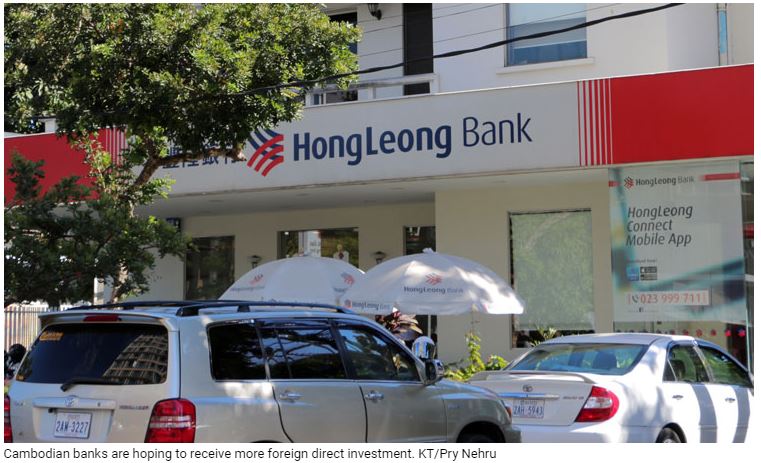Cambodia: Big rise in foreign direct investment
The National Bank of Cambodia (NBC) forecasts the inflow of foreign direct investment (FDI) into the country will rise 10 percent in 2020, reaching $3.95 billion, according to the its macroeconomic and banking sector update for 2019 and outlook for 2020.
The report shown the FDIs for the financial sector will reach $1.37 billion and non-financial sector will be reach $2.58 billion this year.
NBC said in 2019 Cambodia attracted nearly $3.6 billion from FDIs, of which 43 percent came from China, 11 percent from South Korea, 7 percent from Vietnam, six percent, from Singapore and six percent from Japan. A total of 27 percent came from other nations.
The report said international reserves have reached $11.1 billion, equal to seven months of imports and services. The Central Bank predicted that the Kingdom’s real economic growth will be maintained at an average of 7 percent with an inflation rate of 2.3 percent in 2020, according to the report.
Lim Heng, vice-president of Cambodia Chamber of Commerce, sat that at present, more FDIs are pouring into all sectors. He added that the growth of real estate, construction in general and agriculture are also on the rise.
He said that said the growth rate of imports and exports will remain strong in Cambodia in 2020 because there are more new businesses registered in the Kingdom in 2019.
“Now, the government is amending investment laws and the laws on special economic zones and other internal reforms. It’s reducing paperwork to facilitate trade and make it more attractive,” he says.
“Our local production to supply the markets is still low, so if there are more imports, there will be more exports. Now, imports are higher than exports, but previous exports and current exports are different. At present, exports and imports are both increasing, so the scale is different, but our local market purchasing power is strong so investors want to invest here,” says Lim.
The NBC, however, says the forecast for the economic growth is based on the projection of the recovery of the global economy which will contribute to a favourable climate for exports, foreign direct investments and the tourism sector while Cambodia’s economy can also take a lot of advantages from its diversified-based growth and comprehensive reform to support sustainable development.
“Exports are expected to grow high, especially the exports of travelling bags and other manufacturing products. Although, the exports of garments will slow down,” NBC’s report said.
“Although the EU may decide to withdraw the EBA [Everything but Arms trade deal] from Cambodia in February 2020, the exports of the garments from Cambodia is expected to grow because the full withdrawal EBA process will become effective and implemented six months after the decision is made,” the report added.
It said that Cambodia will still export to the EU but the EBA preferential status may be removed. The NBC added that the loss of the EBA will just increase the value of Cambodia’s export products to the European Markets because of tariffs of around 0.1 percent to 12.5 percent according to the types of products.
“If there is still demand from EU markets for Cambodian products, the exports from Cambodia to the EU will remain robust, especially after the Brexit of England from the EU because Cambodia’s exports to England are around 20 percent of the total exports to the EU,” the NBC pointed out.
The NBC report said that the increase of the minimum wage, however, has yet to affect the Kingdom’s competitiveness because the rate is increasing step by step while the productivity is also increasing.
The Government has also introduced some measures to reduce the production cost, launch the SME Bank (small and medium enterprise bank) and facilitate doing business in Cambodia, aiming at creating a better business environment in the country to support investments, pushing domestic production and promoting diversification of the export market.
“Cambodia’s economic growth will be supported by the inflow of FDIs, the growth of construction and the tourism sector,” the NBC added.
Mey Kalyan, senior adviser of the Supreme National Economic Council in Cambodia, said that the country has to build a comprehensive and strong economy and globalise it and not rely solely on the rest of the world. “We should diversify our products and boost local products to protect against risk and provide added-value to all stakeholders. We have to do more.”
What Cambodia has to do in the longer term is develop human resources and technology, improve the investment climate, modernise agriculture and protect the environment, he says. Developing science and technology are also important.
“From 2020, we have to tighten our belts. It’s not business as usual for both the administration and the private sector. We should try to build the country,” Mey concludes.
Source: https://www.khmertimeskh.com/50678298/big-rise-in-foreign-direct-investment


 English
English




